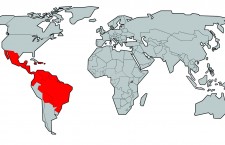 The mosquito-transmitted infection called the Zika Virus made its way into the Western hemisphere this past May. Zika Virus first originated in the Zika forest in Uganda in 1947.
The mosquito-transmitted infection called the Zika Virus made its way into the Western hemisphere this past May. Zika Virus first originated in the Zika forest in Uganda in 1947.
It is commonly found in Africa and Asia, but
last May, the Pan American Health Organization (PAHO) issued an alert for a confirmed case of the virus in Brazil. Now the virus has spread through almost all of South America, Central America, and is approaching the Caribbean islands.
Zika comes from infected Aedes species mosquito. The most common symptoms of Zika are fever, rash, joint pain, and conjunctivitis (red eyes). The symptoms are usually mild and last for a week. Because of its mild symptoms people do not know they are infected until later so they don’t see a doctor until it gets to its worst. People rarely die from Zika, but it does have potentially permanent effects, especially for women in regards to child bearing.
The disease can be transmitted from a pregnant woman to her fetus and through sexual intercourse. According to the Center for Disease Control, if the virus is transmitted to a fetus, it is common for the fetus to have birth defects. There were reports of a serious birth defect of the brain called microcephaly, which is a condition in which
a baby’s head is smaller than usual. Also, some reports from the CDC indicate that women who are infected have the risk of being unable to conceive children.
Experts say there is a chance that the United States will begin to see cases of the virus because of its proximity to South America. Many students have family in Brazil that are dealing with the paranoia of the virus.
“One of my family friends got infected with the virus in Rio, but he is fine now. My family in Rio fear the virus so they are being careful,” said senior Philippe Bethlem.
According to the CDC, all of Brazil is in the high risk zone of the virus as well as many other countries in the continent.
“Some of my family lives in Curitiba, but luckily there have been no cases of the virus in their city. They still take many precautions” said senior Marina Santos.
Although there is no vaccine for Zika, there are ways to protect oneself against the virus, such as covering skin when outside, wearing mosquito repellent, and avoiding travel to infected areas. Once a person has been infected, he or she is likely to be immune to having the virus again.
















